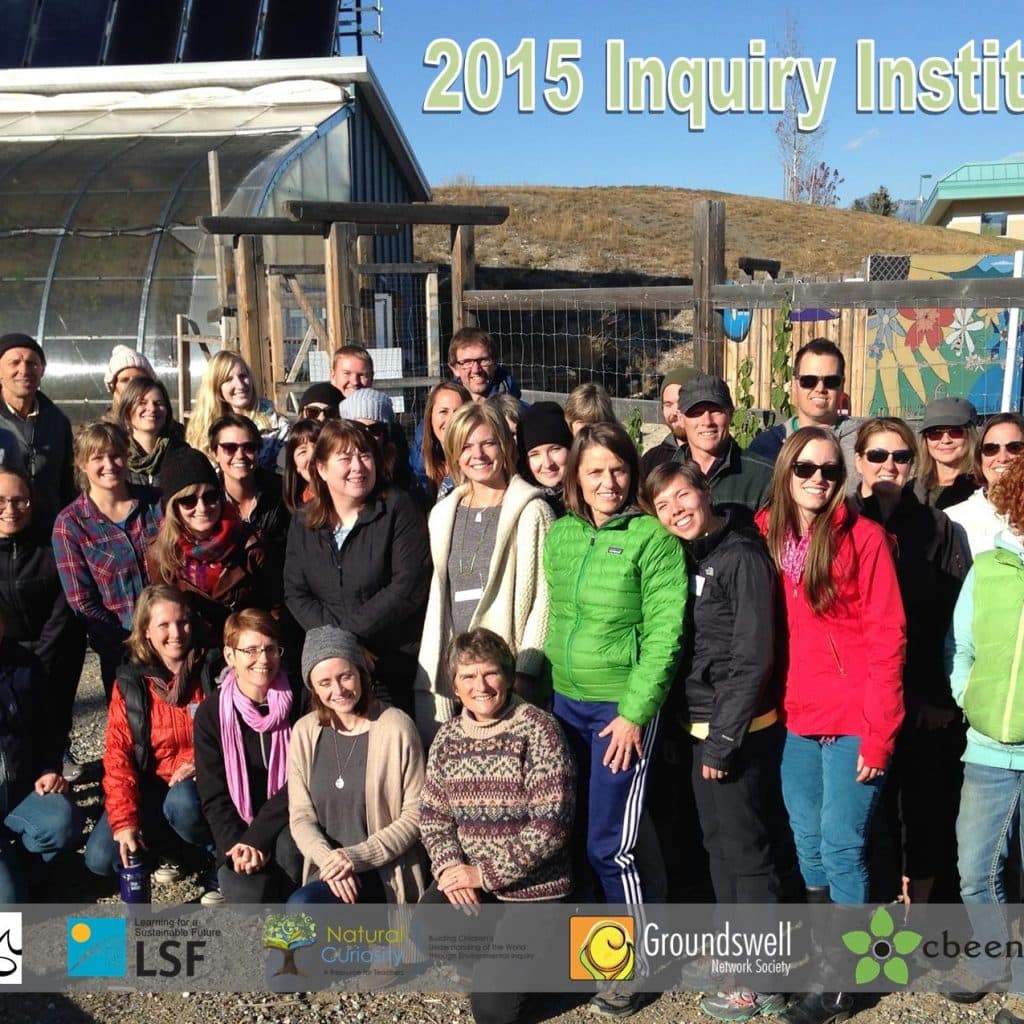
Inquiry Institute
CBEEN has helped to bring in Environmental Inquiry Institutes to the Columbia Basin in 2015 (Invermere) and 2016 (Nelson).
What is the Inquiry Institute? Educators are faced with the challenge of preparing students for a changing 21st century world. Institutes bring together educators to share their interests and experiences while advancing their practice and that of their colleagues. Hosted jointly by Learning for a Sustainable Future and Natural Curiosity, these Institutes give educators the opportunity to:
- Identify and begin to address their individual questions, issues and challenges relevant to applying inquiry in their professional practice
- Experience professional inquiry methods that can in turn be applied with students
- Investigate collaborative knowledge building principles and methods
- Gain confidence in planning authentic inquiry learning experiences and applying appropriate assessment methodology


Feedback from past participants
I learned that inquiry is not something new and big and unachievable. I have already been doing small inquiry projects throughout my years as a teacher. I can also feel good about starting new small projects whenever I notice my students are fascinated by a particular topic. Inquiry is just this – noticing when one’s students are curious about something and then guiding them in their process of learning more about the topic – whether they’re in grade 1 or grade 12. Inquiry can be inside, and it can be outside, it can have a skeleton plan by the teacher, or planned by the students (perhaps with some guiding depending on students’ level). Lastly, I enjoyed learning about the inquiry projects of other teachers as they were inspiring and empowering! – Jessie King, Crawford Bay
The Inquiry Institute was amazing! The inquiry process was modeled through the facilitation of the two days. Some key learning pieces for me: inquiry supports the integration of curricular areas and the big ideas laid out by the BC Ed. Plan, inquiry begins with a provocation and is supported through knowledge building circles (KBCs) and place-consciousness can be supported and developed through the inquiry process. – Kristie Crowe, Nelson
Activities that happen outside can lend themselves to starting points to inspire inquiry projects in the classroom. It can be a rich mulit curriculum approach that encourage critical thinking skills. It was wonderful to meet other teachers like me who have similar passions and look at how we can better improve our teachings. It was valuable to talk about assessment how it works in the inquiry model. – Kate Ruoss, Cranbrook
I learned important key concepts for building an inquiry based environment in my classroom. From small changes that I can implement right away, to larger term-based projects, the institute has given me the confidence to use more inquiry based learning with my students. Specific examples proved that inquiry-based learning can range in size and scope, and fits perfectly with environmental education programs. Furthermore, I learned how to blend learning about the environment to other less obvious subjects such as Math and French. The institute was conducted using inquiry-based concepts and lessons, which in turn strengthened the learning. – Jennifer Heath, Fernie
Inquiry learning builds on techniques environmental educators regularly use in their practice – using leading questions to pique kid’s interest and connect them to the topic. Inquiry learning is flexible – the approach can be used in short blocks of defined time or as a guiding principle for an entire program/term. EE programs can be used to support a teacher’s inquiry learning in the classroom in a variety of ways: a field trip could trigger or initiate the inquiry learning process, presentations can help inquiry learners build knowledge and skills related to their topic, we can answer questions and pose them too, and we can help students apply their knowledge and skills beyond the school. – Lorri Horrocks, Invermere
The Inquiry instituted was beautifully facilitated. We learned about and how to employ Inquiry-based Learning Methods by actually following the same process ourselves, with each participant work-shopping their own project ideas. More specifically I was able to tease out practices and techniques in facilitating student-directed inquiry as a Community Educator, which will be incredibly valuable knowledge as the WVFK program adapts to the changing BC Curriculum. Ultimately the workshop reminded us of and empowered us in our role as the facilitators of a child’s learning. Inquiry learning can take many forms, short or long-term. It is made possible by the receptivity of the educator, the willingness to take a risk in addressing questions with no clear answers and projects with no clear outcomes, and in making necessary adaptations to mistakes or new findings. Even in our role as educators, we are too students in classroom inquiry. – Sonja Seher, Kimberley

